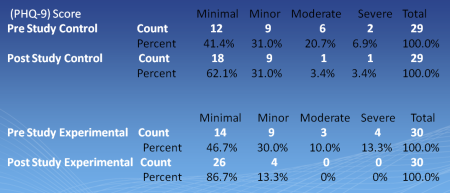A Popcap-sponsored study of using casual games as treatment for depression has been making the rounds the last few days. (Here, here, here.)
The table shows changes over time (pre study – post study): test subjects who were told to play a casual video game at regular intervals (bottom data) showed much greater improvement than a control group who were not asked to make any changes (top data).
As usual, I should say that I am not trained in psychology, but the study would be a lot stronger if there was a second control group who was subject to another type of intervention – therapy, drugs, any kind of behavioral change. As far as I know, certain psychological states are not only likely to change over time (as happens with the control group who does get better), but are also influenced by any type of intervention or change in behavior. The two underlying questions that I would like to see answered:
- Does Bejeweled work better than cooking classes or reading?
- Do different games work differently? My feeling is that asking novice users to play StarCraft II would increase depression.
(The study isn’t published yet, but the slides can be found here.)


I would add one further question that is highly relevant: do casual games like Bejeweled help with certain types of depression more than others? That is, does it help more with depression which is comorbid with anxiety leading to negative thought patterns? My hypothesis would be that yes it would help more with this sort because unlike a cooking class, a game like bejeweled distracts the user from their own internal dialogue; a cooking class will also but the second there is a lapse in activity the internal dialogue is present. Basically, I’d like to know if it helps in a cognitive behaviour management way rather than to actually treat depression, but to help certain people manage their depression by silencing internal thoughts which exacerbate anxiety and depression. In this way it isn’t seen as intervention per se (i.e. doing something) but perhaps as a tool to release oneself from damaging patterns.
To this end I would also want to investigate your second question as to whether the type of game matters. I would think that it does immensely if you’re coming from the above perspective. I would think that a game which is high intensity but not too difficult which doesn’t allow or even promote players to think would be the more useful one in that it allows them a break from depressive thoughts. Also, I agree something that is relatively easy but not too easy is also important. A game with a strong learning curve will only exacerbate frustration and cause more negative feelings.
I think ultimately the question that needs to be asked is whether casual games act as a better tool for distracting from negative thought patterns than other activities which are not as cognitively engaging and do not show as immediate of rewards. One can see how a cycle of positive feedback could be established through the use of casual games, breaking a cycle of negative thoughts (dwelling, ruminating, obsessing etc) and also giving a reward for not engaging in those thoughts.
Sorry for being wordy and not clear. I’m obviously typing as I think.
This doesn’t say anything about casual gaming and depression, but I have talked to psychologists and therapeuts who use MMORPGs to help substance addicts handle their addiction. What it does is mainly to distract the player from his/her problems and offer rewards for forcusing on the game rather than on their problems, something which sometimes can be all that’s needed to cope.
Based on this, I don’t think anybody can be cured of addiction or depression by playing Bejeweled, but I think they can be distracted from their problem for long enough that they will be able to get over the largest bumps, and perhaps cope better.
@Chelsea What you are saying is also that an activity needs to be sufficiently intensive to work. As for different types of depression, I guess we are in a situation where (much) more research is needed.
@Torill I did not know that. I guess casual games and MMORPGs also share the trait that players are almost certain to progress at first, which is always uplifting.
And where is the placebo group who is told that they’re playing a casual game, but really are not? Instead they’re given LIMBO.
@Rasmus That’s what’s so tricky about psychological studies: there are an infinite amount of things you can test.
Interesting study…I’m curious whether letting the control group surf a website about depression might actually work as a trigger and have a negative impact on their emotional state. Is anyone familiar with depression treatment and could comment on that?
Other than that, I agree with Chelsea that results on games vs. other activities would be interesting.